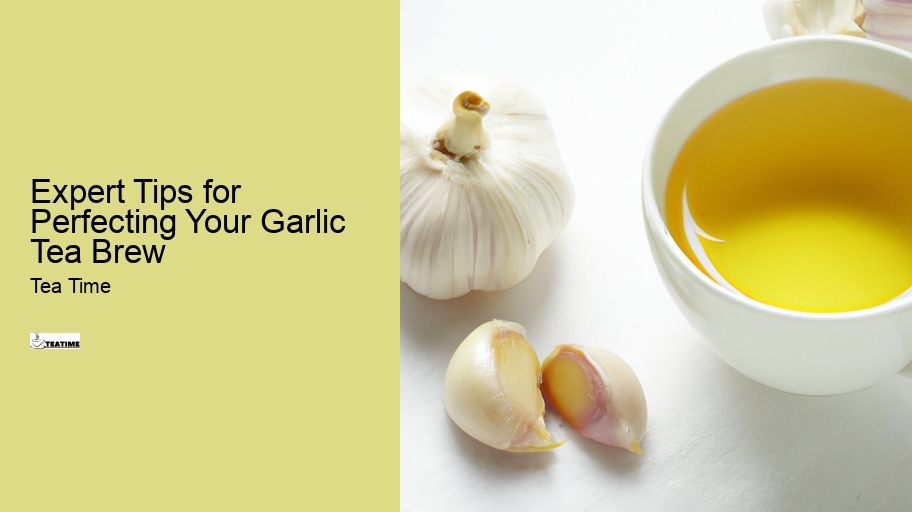

Garlic tea is increasingly recognized for its benefits in promoting heart health. The compounds in garlic, particularly allicin, have been shown to have a positive impact on cardiovascular health.
Regular consumption of garlic tea may help in regulating blood pressure. Its natural properties can dilate blood vessels, leading to reduced pressure on the arterial walls. Digestive Health This effect can be particularly beneficial for individuals with hypertension or those at risk of heart diseases.
While garlic tea can be a valuable addition to a heart-healthy diet, it's important to maintain a balanced approach that includes regular exercise and a nutritious diet. Consulting with a healthcare professional is also advisable, especially for those with existing heart conditions or those taking medication.
Growing garlic at home for tea is a rewarding experience that ensures you have a fresh, organic supply. Garlic is relatively easy to grow and can be cultivated in gardens or pots. Planting garlic cloves in well-drained soil and ensuring they receive adequate sunlight are key factors for successful growth.
Harvesting garlic at the right time is crucial for optimal flavor and health benefits. Garlic is typically ready to harvest when the leaves turn yellow and begin to dry. Once harvested, it should be dried and stored properly to preserve its properties.
Using home-grown garlic in your tea not only adds a personal touch but also guarantees the purity and potency of your brew. This practice connects you to the process of creating a healthful beverage from start to finish, enhancing the overall experience of enjoying garlic tea.
Garlic BulbsGarlic tea's benefits extend beyond internal health to include skin health. The antioxidants and anti-inflammatory compounds in garlic can have a positive impact on skin conditions.
The antimicrobial properties of garlic also play a role in skin health.
While garlic tea can be a supportive element in skin care, it's also important to maintain a holistic approach that includes a balanced diet, proper hydration, and regular skin care practices. As with any natural remedy, individual experiences may vary, and it's advisable to consult with a healthcare professional for personalized advice.
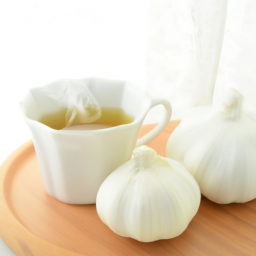
Enhancing the flavor of garlic tea can make it a more enjoyable and versatile beverage. Adding spices like cinnamon, cloves, or cardamom can introduce a warm, aromatic dimension to the tea. These spices not only improve the taste but also bring additional health benefits, such as improved digestion and anti-inflammatory effects.
Experimenting with different combinations of spices allows you to customize your garlic tea to your liking.
Personalizing your garlic tea with spices and other flavor enhancers can transform it from a health drink into a delightful beverage. It becomes a versatile tea that can be tailored to suit different moods and occasions, making it a staple in your beverage repertoire.
Garlic tea can be an effective natural remedy for stress relief. The soothing properties of a warm cup of tea, combined with garlic's natural compounds, can help reduce stress and promote relaxation. Drinking garlic tea may aid in calming the nervous system and reducing the physical and psychological effects of stress.
The antioxidants in garlic tea also contribute to its stress-relieving properties. They combat oxidative stress in the body, which can be exacerbated by chronic stress.
Incorporating garlic tea into your daily routine can be a simple and natural way to manage stress. Its calming effects can provide a moment of tranquility in a busy day, making it a valuable addition to a stress management regimen.
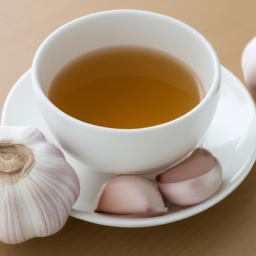
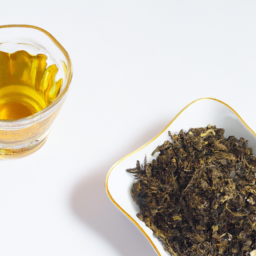
While garlic tea is generally safe for most people, it's important to consider some safety aspects. Those with garlic allergies or intolerances should avoid it. Additionally, garlic can interact with certain medications, particularly blood thinners and drugs for hypertension. It's crucial to consult with a healthcare professional before adding garlic tea to your regimen, especially if you are on medication.
Consuming garlic tea in moderation is key. Excessive intake may lead to digestive discomfort, including heartburn or upset stomach. It's also advisable for pregnant or breastfeeding women to consult with a healthcare professional before consuming garlic tea.
By being mindful of these safety considerations, you can enjoy the benefits of garlic tea without adverse effects. Vitamin C It's all about balancing the consumption with your individual health needs and circumstances.
Garlic tea can play a supportive role in diabetes management.
The antioxidant properties of garlic also contribute to its potential benefits for diabetes. These properties can help combat oxidative stress, a factor associated with diabetes complications. Garlic tea's anti-inflammatory effects can further support overall health in individuals with diabetes.
However, it's important to use garlic tea as a complement to, not a replacement for, prescribed diabetes treatments. Monitoring blood sugar levels and consulting with a healthcare professional is essential when incorporating garlic tea into a diabetes management plan.
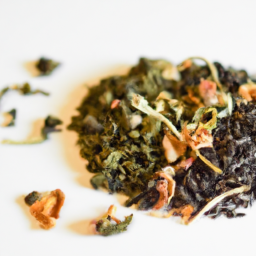
To make garlic tea, start by peeling and lightly crushing 2-3 cloves of fresh garlic to release their oils. Steep the crushed cloves in a cup of hot water for about 5-10 minutes. Strain the garlic and add lemon or honey to taste, if desired. Adjust the amount of garlic and steeping time according to your taste preference.
Yes, garlic tea can be beneficial in relieving symptoms of colds and flu. Garlic has natural antibacterial and antiviral properties that may help in fighting infections. Drinking warm garlic tea can also provide soothing relief for sore throats and congestion.
There is no standard recommendation, but moderate consumption, such as a cup a day, is generally considered safe and beneficial. It's important to listen to your body and adjust the frequency based on how you feel.